
German postcard by Ross Verlag, Berlin, no. 611/5. Photo: Union / Ufa. Julius Falkenstein and Ossi Oswalda in Die Austernprinzessin/The Oyster Princess (Ernst Lubitsch, 1919).

German postcard by Ross Verlag, no. 636/1. Ohoto: Maxim Film. Lotte Neumann in the comedy Romeo und Julia im Schnee/Romeo and Juliet in the Snow (Ernst Lubitsch, 1920). The man on the left dressed as antique hero could be Julius Falkenstein as Paris. The others are from left to right Jakob Tiedtke (Herr Capulethofer), Marga Köhler (his wife), Lotte Neumann (Julia) and Gustav von Wangenheim (Romeo Montekugerl).

German postcard by Verlag Hans Dursthoff, Berlin, no. 1646. Photo: Ufa Kulturfilm. Julius Falkenstein in Der behexte Neptun (Willi Achsel, 1925).
One of the most popular film comedians of the German silent cinema
Julius Falkenstein was born in 1879 in Berlin, the capital of Germany.
Falkenstein probably received his first theatre engagement in Berlin in 1904/1905. From 1906, he was on stage at the Residenztheater in Berlin. In the following years, he played mostly on the Berlin theaters, interrupted only by engagements from 1908 to 1910 at the Lustspielhaus Düsseldorf, 1911 at the Vienna Volkstheater, and 1912 at the Theater an der Wien. Falkenstein, who was valued above all for his comedic qualities, often went on guest tours and acted himself several times as a game director.
From 1914, he was also prolific in silent films, essaying diverse eccentric character parts. He had his first film appearance in the detective film Die geheimnisvolle Villa/The Black Triangle (Joe May, 1914) the first in the series starring the fictional gentleman detective Stuart Webbs (Ernst Reicher), modeled on Sherlock Holmes.
During the silent era, he did his best work for the famous directors Friedrich Wilhelm Murnau and Ernst Lubitsch. For Murnau, he played in Schloß Vogelöd/The Haunted Castle (Friedrich Wilhelm Murnau, 1921), and Die Finanzen des Großherzogs/The Grand Duke's Finances (Friedrich Wilhelm Murnau, 1924) with Harry Liedtke and Mady Christians.
He appeared in such Lubitsch comedies as Der Rodelkavalier/The Toboggan Cavalier (Ernst Lubitsch, 1918) Die Austernprinzessin/The Oyster Princess (Ernst Lubitsch, 1919) starring Ossi Oswalda, and Romeo und Julia im Schnee/Romeo and Juliet in the Snow (Ernst Lubitsch, 1920) starring Lotte Neumann. Julius Falkenstein belonged to the most popular film comedians of the German silent cinema.

German postcard by Ross Verlag, Berlin. Photo: Phoebus Film Julius Falkenstein in the historical comedy Der Meister von Nürnberg (Ludwig Berger, 1927), based on Richard Wagner's opera 'Die Meistersinger von Nürnberg'.

German postcard by Ross Verlag, Berlin. Photo: Phoebus Film. Veit Harlan and Julius Falkenstein in Der Meister von Nürnberg/The Master of Nuremberg (Ludwig Berger, 1927).
The audience has to laugh and cry at the same time
Julius Falkenstein played aristocrats, military, directors, secretaries, and accountants in a stream of films. In addition, he still found time for theater assignments, at the Komische Oper and in the Theater am Kurfürstendamm. He also wrote a comedy himself called 'Julie', which was staged with great success.
IMDb quotes Falkenstein: "It is my wish to play good tragic-comical roles under good directors - roles where the audience has to laugh and to cry at the same time".
The transition to the sound film didn't cause him any trouble. In the 1930s he even made more films than he did in the 1920s. In the last four years of his life, he played in almost twenty films a year.
Among his sound films are hits like Der Kongress tanzt/The Congress Dances (Erik Charell, 1931) with Lilian Harvey and Willy Fritsch, Berlin-Alexanderplatz/Berlin-Alexanderplatz: The Story of Franz Biberkopf (Phil Jutzi, 1931), Ich und die Kaiserin/The Only Girl (Friedrich Hollaender, 1933) starring Lilian Harvey and Das häßliche Mädchen/The Ugly Girl (Henry Koster (as Hermann Kosterlitz), 1933) featuring Dolly Haas.
Falkenstein was Jewish but he secured a special permit to continue making films following the Nazi rise to power in 1933. However, he made only one further film. Julius Falkenstein died of meningitis in 1933 in Berlin, Germany. He was 54. His grave is in the Jewish cemetery in Berlin-Weißensee. He was married to Helene Julie Zillinger.

German postcard by Ross Verlag, Berlin, no. 3708/1, 1928-1929. Photo: Ufa.

German collectors card in the series 'Vom Werden deutscher Filmkunst - Der Tonfilm', album no. 11, picture no. 32. Photo: Cine-Allianz / Ross Verlag. Jan Kiepura and Julius Falkenstein in Das Lied einer Nacht/The Song of Night (Anatole Litvak, 1932).
Sources: Thomas Städeli (Cyranos - German), Wikipedia (German and English), and IMDb.
No comments:
Post a Comment